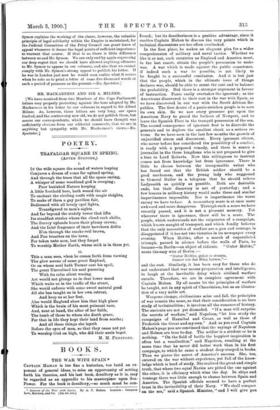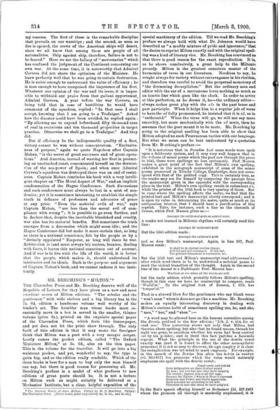BOOKS.
THE WAR WITH SPAIN.*
CAPTAIN MAHAN is WO fine a historian, too lucid an ex- ponent of general ideas, to miss an opportunity of setting forth his theories, and his last book, desultory as it is, may be regarded as an appendix to his masterpiece upon Sea- Power. For the book is desultory,—so much must be eon- Lessons of the War with Spain. By A. T. Mahan. London : Sampson Low, Marston, and Co. [10e. 6d. net.]
fessed; but its desultoriness is a positive advantage, since it enables Captain Mahan to discuss the very points which in technical discussions are too often overlooked.
In the first place, he makes an eloquent plea for a wider comprehension of military and naval tactics. Whether we like it or not, such countries as England and America must, in the last resort, obtain the people's permission to make war. A war which is made against the public conscience, if indeed such a war be possible, is not likely to be fought to a successful conclusion. And it is but just that the people, which in the ultimate issue of things declares war, should be able to count the cost and to balance the probability. But there is a stronger argument in favour of instruction. Panic easily overtakes the ignorant ; as the
Americans discovered to their cost in the war with Spain, as
we have discovered in our war with the South African Re- publics. The first desire of a panic-stricken people is to save its own skin. So we saw every pressure put upon the American Navy to guard the bathers of Newport, and to leave the Spanish Fleet in the tranquil possession of the sea. The second consequence of ignorant fear is to discredit the generals and to deplore the smallest check as a serious re- verse. So we have seen in the last few months the growth of unjustified alarm and discontent. Every ignorant citizen,
who never before has considered the possibility of a conflict, is ready with a proposed remedy, and there is scarce a journalist in the three kingdoms who is not prepared to give a hint to Lord Roberts. Now this willingness to instruct comes not from knowledge but from ignorance. There is little to choose between the irresponsible writer who has found out that the British soldier should be a good marksman, and the young lady who suggested to General Buller in a telegram that he should relieve Ladysmith as quickly as possible. Both are desirable ends, but their discovery is not of yesterday ; and a few lessons in military history would make these and similar impertinences impossible. Nor is impertinence the worst enemy we have to face. A momentary scare is at once more awkward and more dangerous. Through such a scare we have recently passed, and it is not a pleasant memory. Yet wherever there is ignorance, there will be a scare. The people, which understands not the exigencies of a campaign, which knows naught of transport, and which fondly believes that the only necessities of warfare are a gun and courage, is disappointed if it has not two victories in its newspaper every evening. When Moltke, after a march of unparalleled triumph, paused in silence before the walls of Paris, he became—in Berlin—an object of ridicule. " Gater Moltke," wrote the easy wits of Berlin :— " Guter Moltke, gehst so stiunm, Immer um des Ding herum,"— and the rest. Similarly, it has been easy for those who do not understand that war means preparation and intelligence, to laugh at the inevitable delay which civilised warfare entails. Therefore, we are in complete agreement with Captain Mahan. By all means let the principles of warfare be taught, not in any spirit of Chauvinism, but as an illustra- tion of a very noble art.
Weapons change, civilisations arise and fall, the principles of war remain the same, so that their consideration is no bare study of technicalities ; it involves all the romance of history. The ancients are not yet dismoded. "If a man will surprise the secrets of warfare," said Napoleon, "let him study the campaigns of Hannibal and Caasar, as well as those of Frederick the Great and my own." And as you read Captain Mahan's page you are convinced that the sayings of Napoleon and Nelson are true to-day. The soldier is a student or he is nothing. "On the field of battle the happiest inspiration is often but a recollection," said Napoleon, recalling at the same time that he never did better work than in his first campaign, to which he came a student deep-steeped in books. Thus we pierce the secret of America's success. She, too, entered on the war without experience, yet full of the know- ledge which is bred of study. She realised the great and simple truth, that where two equal Navies are pitted the one against the other, it is efficiency which wins the day. In ships and tonnage there was little enough to choose between Spain and America. The Spanish officials seemed to have a perfect trust in the invincibility of their Navy. "We shall conquer on the sea," said a Spanish Minister, "and I will give you
my reasons. The first of these is the remarkable discipline that prevails on our warships; and the second, as soon as fire is opened, the crews of the American ships will desert, since we all know that among them are people of all nationalities. Ship against ship, therefore, failure is not to be feared." Here we see the fallacy of " mercenaries " which has confused the judgment of the Continent concerning our own war. At the same time, it is noteworthy that Admiral Cervera did not share the optimism of the Minister. He knew perfectly well that he was going to certain destruction. He is sailor enough to understand the value of efficiency ; he is man enough to have recognised the impotence of his fleet. Whatever our opinion of the war and its issue, it is impos- sible to withhold our praise from that gallant opportunist, Admiral Cervera. A year before the war Cervera, on being told that in case of hostilities he would have command of the squadron, replied : "In that case I shall accept, knowing that I am going to a Trafalgar." Asked how the disaster could have been avoided, be replied again : "By allowing me to expend beforehand fifty thousand tons of coal in evolutions and ten thousand projectiles in target practice. Otherwise we shall go to a Trafalgar." And they did.
But if efficiency be the indispensable quality of a fleet, victory cannot be won without concentration. "Exclusive- ness of purpose," again we quote Napoleon after Captain Mahan, "is the secret of great successes and of great opera- tions." And America, instead of wasting her fleet in protect- ing an nnattacked coast, concentrated herself on the destruc- tion of the sea-power of Spain; and when once Admiral Cervera's squadron was destroyed there was an end of resist- ance. Captain Mahan concludes his book with a very intelli- gent chapter on "The Moral Aspect of War," and an implicit condemnation of the Hague Conference. Such discussions and such conferences must always be lost in a mist of aca- demics; yet it is sometimes interesting to establish the simple truth in defiance of professors and advocates of peace at any price. "Even the material evils of war," says Captain Mahan, "are less than the moral evil of com- pliance with wrong "; it is possible to go even further, and to declare that, despite the inevitable bloodshed and cruelty, war also has its material benefits. But sometimes the truth emerges from a discussion which might seem idle ; and the Hague Conference did but make it more certain that, so long as there is a national conscience, felt by the people or by a "divinely appointed" Emperor, so long will there be war. Arbitration is (and must always be) useless, because, dealing with facts, it leaves this national conscience out of account. And if war is to live with the life of the world, it is better that the people, which makes it, should understand its intricacies and its ideals. Such is the purpose and argument of Captain Mahan's book, and we cannot endorse it too insis- tently.







































 Previous page
Previous page